#so every character ends up ridiculously hyper-competent at one point or another
Explore tagged Tumblr posts
Note
Before reading the comics, thanks to sladixk fics, i genuinely thought that dick always lost to slade, now I know that most times when he's and adult he beats slade no problem but it got me wondering how you feel about this canon-fanon difference
OHH this is a good question!!
i think sometimes fanon makes Slade a little... too badass. i think something some fanon fans don't understand about Slade in the 80s/90s is that he was like... kind of a loser? like don't get me wrong he was a main villain of the Titans for a while and he was certainly meant to be a formidable villain but this reputation he has in fanon almost supersedes him. (for example with specific plots: the fandom interpretation of the Judas Contract is Slade as the mastermind, but the writers have said that Terra was supposed to be the big villain manipulating everything. which is a ridiculous thing to put on a teenage girl getting groomed but, it does depict the intention of who was supposed to be "at fault" in that story) and don't get me wrong, i definitely love playing up the reputation and aura Slade has, but he really is a general contract killer on the level of like, Deadshot. personally, i wouldn't even put him on Lady Shiva's level, i think she far outranks him.
and to be fair to some fanon, recent comics have... tried to badass-ify Slade. some of his more recent Deathstroke runs are really trying to put him as this guy with legions of men underneath him who's this *deadly* killer who can take on Batman and Superman and all the like. and i just find that... boring? like, do i enjoy him being a smarter-than-average villain with a lot of connections? yes. but i don't think anything in his backstory really lends him to being as formidable as he appears in some fanfiction that puts him on this untouchable level. i would personally go as far to say i think *most* of the Batfamily could beat him in a fight under the right circumstances. bc Slade really is just Some Guy who got a serum from the military and went AWOL. (there's certainly more to his backstory than that, but at a glance, he's really not a trained fighter from birth like other characters are) and whilst i do enjoy Slade being formidable i have to admit, it was sort of fun when he was a loser? and i've gotten a kick out of certain comics that point out he's only a terrifying villain when he's up against teenagers. (Ghost-Maker calling him out on that is one of the funniest things, to me) like could Slade give Batman a serious fight? sure, but i don't see him ever winning unless you *really* nerf Bruce. and i really don't see him ever winning against most of the Batkids once they've got some years under their belt. Slade's scare factor was always tapered by who he was against, and he was a *Teen Titans* villain. so he's a little ridiculous and sometimes just sort of a weird loser. and i say that affectionately.
furthermore, on the flipside, i think... sometimes, we woobify Dick a bit too much to my tastes. or, really any Robin who gets shipped with Slade but of course Dick is the standout in popularity and i find it's more prominent with him. it's really a general slash problem, in which one man must be the Strong Top and then other must be the Weak Bottom. and that manifests in Slade being physically larger than Dick (which in canon, ehhh i think the size difference would be largely negligible) and him being able to beat Dick. bc it makes for more fanfic scenarios where you can put Dick at Slade's mercy for porn, for angst, for whatever you'd like. Slade is a good pick if you want to really put Dick on the weaker side, bc you can play with healing factors and strength enhancements. so on a physical level, Slade will be stronger than Dick. does that mean Slade can beat Dick in a fight? historically, no. i mean, Slade trusted Dick to train his own daughter in the Renegade storyline, so i think this is a fact even Slade is aware of.
i don't think it's a bad thing fanfiction likes its big top/small bottom tropes. if you want to make Dick a submissive, pliant bottom who is going to lose in a fight to Slade for your dead dove porn, get it. i've probably written or will write the same. it's appealing and it's a very common trope for Dick. but it becoming the fandom norm does sort of nerf Dick, occasionally. i think some fans don't fully comprehend the actual level Dick is on, where he's very close to being an equal to Bruce, if not already Bruce's equal. in fandom Dick is sort of trapped in this "post-adolescence but not full adulthood" state that does not acknowledge he has been an adult running superhero teams for years. he was filling in for Bruce in the Batman mantle all the way back in the 90s. he can defeat villains like Slade, and usually without a lot of difficulty. to me the only time you can realistically make Dick lose and it be "in character" is either 1, to have Dick *very* early on in his Robin years (i think if he's past 16, he can beat Slade) or 2, very deeply wound Dick/have him in a psychologically altered state via drugs or something. otherwise yeah, i think Dick wins 99% of the time.
but fanfiction is fanfiction, and it doesn't *have* to be canon. esp if Dick losing to Slade is just a sexy prerequisite to porn. do i wish more fanon explored Slade as kind of a loser? absolutely. do i think Slade is *too* cool in most fanon? also absolutely. but those are my tastes and i don't begrudge anyone who just wants a strong, mean man to whump the shit out of their blorbos, which usually, is the purpose of Slade. i find most fanfic with Slade tends not to be exploring Slade's character. they're simply using him as an easy stand-in for a metahuman who's morally grey and very mean but has a nuanced history with Dick, or whoever else. which, very valid. not all fanfic needs to be a character study, but i do think it'd be cool to see more Slade-centric fics that *do* want to be character studies.
#necrotic answerings#slade wilson#sladick#character meta#MAN i lvoe talking about fanon vs canon tysm for this ask#esp with slade!#bc atp it has seeped into canon#like slade rlly was a loser. deathstroke wasn't even intended to be his name. he was the terminator#which sounds far sillier and puts into better contaxt the level of badassery you ewre dealing with#is uber badass slade cool? yes#and i will probably use it for some of my fics for sladerobin week#but like. i sort of want slade-centric fics too#i want exploration of his family dynamic and his friends and how he's kinda just. a run of the mill contract killer#this mans is not special.#he just happened to have staying power and slowly got cooler over time to compensate for his repeated appearances#which is how characters in comics tend to go#you always have to one-up it yk. you always have to up the stakes#so every character ends up ridiculously hyper-competent at one point or another#and it makes it difficult to do anything with them#but i prefer slade knowing he can lose to dick bc it means he has to get more creative when he wants to beat dick#*or* he has to purosefully take advantage of dick when dick is in a vulenrable state#which makes him less cool and more sleezy#and i enjoy that *so* mcuh more for slade#but that's all my opinion yk
30 notes
·
View notes
Text
Remnant’s Top Ten Anime of 2020
2020 Was certainly a ride wasn’t it? To those that managed to make to make it through in one piece, or any piece, good job. Hopefully 2021 is better to us all.
Despite the world mostly being on fire, I’d hazard to say that a lot of good shows came out in 2020 (despite a number of them being delayed to either later in the year or this year altogether). I meant to release this list much earlier, but I kept changing it around.
Anyway, here are the ones I thought were the best.
Honorable Mentions:
Dorohedoro
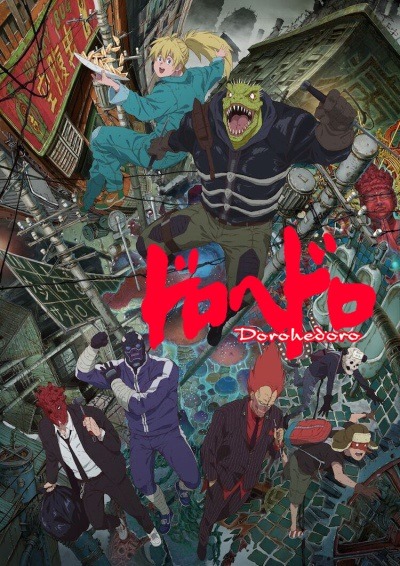
Synopsis: The plot centers on a man named Caiman and his search for his real identity after a transformation by a sorcerer left him with a reptile's head and no memory of his former life.
Along with his friend Nikaido, he violently assaults sorcerers in the Hole, with the aim of taking their heads into his mouth, where a strange face will appear and confirm whether the sorcerer he has bitten onto was the one responsible for his transformation or not.
As the residents of the Hole, the En family and the Cross-Eyes gang, along with many others, collide with one another, the mystery of Caiman's identity begins to unravel, reigniting ancient grudges and threatening to forever change both the Hole and the sorcerers' world.
Thoughts: This is the only Netflix anime I watched this year (I missed out on Great Pretender before the year ended), and I can honestly say I had fun with this one. It’s animation was good, the story was engaging enough, and the characters were all unique (Noi best girl). The one problem I would say with the show is that it can come off as unfocused at times, meandering from one plaot point to another with no real connective tissue.
Still a fun series though.
ID: Invaded
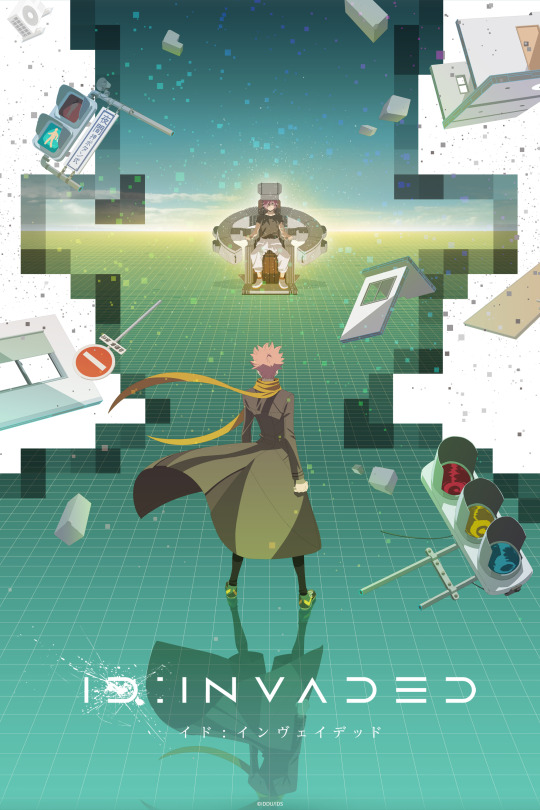
Synopsis: The anime follows the investigations of Narihisago, a renowned detective now in prison, who is tasked with diving into the id wells of various serial killers.
Two years prior to the current events, Narihisago's daughter Muku was brutally murdered by a serial killer, leading Narihisago's wife to commit suicide. These deaths prompted him to hunt down and murder the killer, earning him his prison sentence. He is still depressed and haunted by his wife and daughter's deaths, but also uses this as motivation to take his work seriously and help stop serial killers.
Thoughts: One of a handful of original series that came out this year. This show gave me heavy Inception/Minority Report vibes from both its premise and presentation. It wobbles under the weight of its own concepts towards the end, but it still a fun ride nonetheless.
Gleipnir
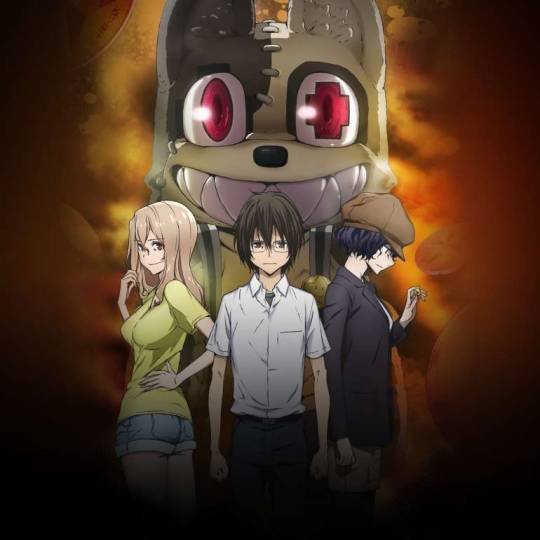
Synopsis: The story centers on Shuichi Kagaya, a high school student with an unusual secret. He has the ability to transform into a monster resembling a giant dog mascot costume with a zipper down his back and a large cartoonish smile. After rescuing a strange girl, Claire Aoki, from a warehouse fire, they join each other to search for Claire's older sister, who is assumed to be responsible for the death of their parents.
Thoughts: When the initial rollout for this show began I admit I wasn’t really a fan. I thought it was just going to be a hyper violent, fanservice show. Now in some ways it is that, but if you really look Gleipnir tells a very interesting tale of identity and what it truly means to have a wish granted. The music was pretty good as well, and that’s really something from me as a person who doesn’t pay attention to soundtracks.
Hope this show gets a season 2, but if not I’ll more than likely start the manga.
Wandering Witch: The Journey of Elaina
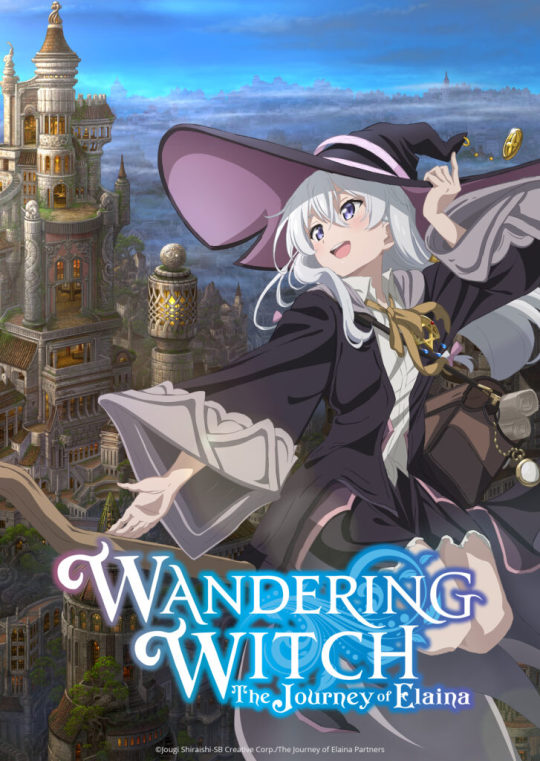
Synopsis: Fascinated by the stories of Niké, a witch who traveled around the world, Elaina aspires to take the same course. Her determination of studying books and magic leads to her becoming the youngest apprentice witch to pass the sorcery exam.
However, when Elaina attempts to receive training in order to become a full-fledged witch, she is rejected due to her extraordinary talents until she finds Fran, the "Stardust Witch," whom accepts her. After earning her title, the "Ashen Witch," Elaina begins her exploration around the world, visiting and facing all kinds of people and places.
Thoughts: As a fan of the Light Novels, I was pretty excited when it was announced it was getting an anime. For the most part it didn’t disappoint. Though it skipped most of the stories in the novels, the show still told a few good stories that made for some amazingly animated tv.
Talentless Nana
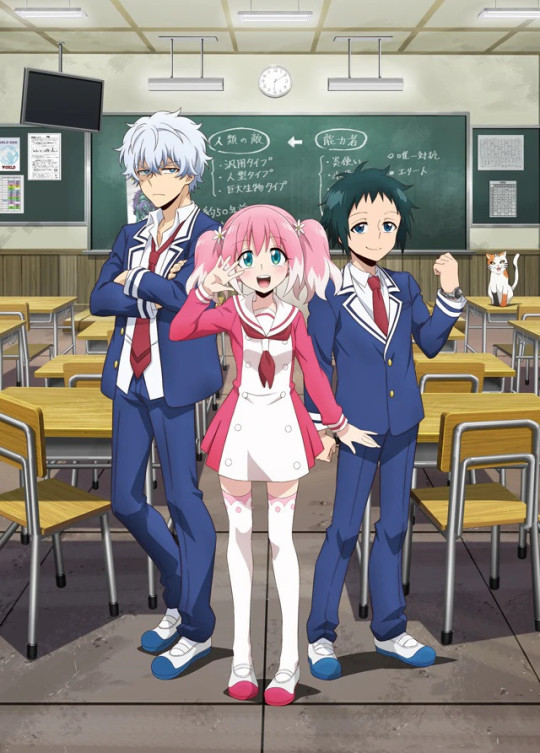
Synposis: In the near future, mysterious monsters known as the "Enemies of Humanity" begin to appear, and with it so do children with supernatural powers called the "Talented". To prepare them for the upcoming battle against these Enemies, all the Talented are sent to a school located on a deserted island, where they have all their daily needs provided for until they graduate and communication with the outside world is forbidden.
One day, a new student named Nana Hiiragi arrives at the school. Her friendly and cheerful personality lets her quickly make friends with the class. However, with Nana comes a whole litany of mysterious occurrences on the island.
Thoughts: I can’t say too much about Nana without spoiling it’s first episode twist, but I will say that its a pretty interesting show with a fairly compelling game of cat and mouse being played.
Now on the the actual list:
10. The Misfit of Demon King Academy
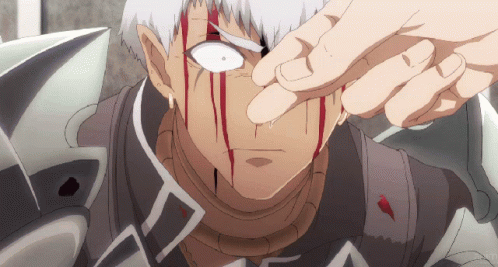
Synopsis: After 2,000 years of countless wars and strife, the demon king Anos Voldigoad made a deal with the human hero, Kanon, to sacrifice his own life to ensure peace could flourish. Reincarnating 2,000 years later, Anos finds that royal demons now harshly rule over lower class hybrid demons in a society that values Anos's pureblood descendants over the demons who interbred with other species, such as humans and spirits.
Finding that magic as a whole has begun to decline and his descendants weaker as a result of the peace he created, Anos, now technically a hybrid himself, decides to reclaim his former title of Demon King, but first, he must graduate from the Demon King Academy where he is labeled a total misfit.
Thoughts: Originally I was going to put Nana in this spot, but its lack of a real ending pushed it out of the list. If only slightly. Misft at Demon Academy is just a fun ride from start to finish. There’s always something about shows with ridiculous OP protagonists (Overlord, One Punch Man, etc.) that gets the blood pumping.
It’s like junk food. Great for the right moment, but not needed all the time.
9. Ikebukuro West Gate Park

Synopsis: A charismatic troubleshooter tries to keep the peace between warring factions while protecting his loved ones in Ikebukuro West Gate Park.
Thoughts: I honestly had no idea what to make of this show when I first saw the synopsis, but I gave it a try on a whim. I’m glad I did because this was easily the dark horse of the Fall season. I really liked the mostly self contained story format the series had, and there were a few very good episodes here. Check it out.
8. My Next Life as a Villainess: All Routes Lead to Doom!

Synopsis: Catarina Claes, the young daughter of a noble family, one day bumps her head and regains memories of her past life as an otaku. It is then that she realizes she has been reborn into the world of the otome game Fortune Lover, reincarnated as the game's villainess who, regardless of what route the player took in the original game, is doomed to be either killed or exiled.
In order to avoid these routes that lead to doom, Catarina begins taking countermeasures to try and avoid things going the same way as the game. This, however, ends up having unexpected consequences on her relations with the other characters of the game's world.
Thoughts: Normally I’m not a fan of Reverse/Otome harem series, but somehow Bakarina managed to pull me in, to a good result. This show was easily one of the best comedies I watched this year with a good cast and a likable protagonist.
7. Deca-Dence
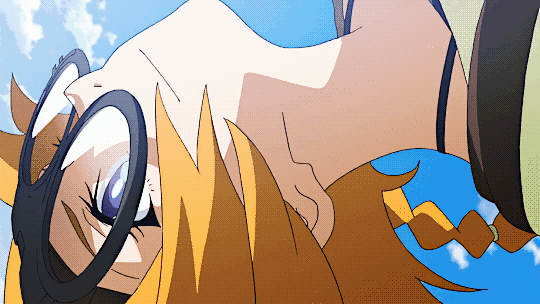
Synopsis: In the fortress city of Deca-dence, the lowly Tanker girl, Natsume, dreams of becoming a Gear warrior following her father's death during a Gadoll attack. She is assigned to a maintenance team led by Kaburagi whom she discovers is more than he appears. Kaburagi has a secret role in eliminating "bugs", humans who threaten Solid Quake's operations.
When Kaburagi discovers that Natsume is listed as dead in the company database, he decides to keep her under observation and offers to train her to fight.
Thoughts: Giant monsters and giant robots. What more do you need? Watch it.
6. A Certain Scientific Railgun T
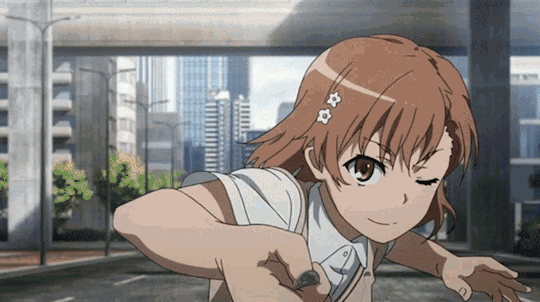
Synposis: The Daihasei Festival has begun, and that of course means that Tokiwadai Middle School—a prestigious all-girls' middle school—is competing too. Despite the participation of the "Ace of Tokiwadai," Mikoto Misaka, the other students who are participating are still putting their utmost effort into winning, no matter how impossible the feat may seem against her might. However, not all is fun and games. Due to the the festival, Academy City opens to the outside world, and various factions have begun plotting ways to infiltrate the city. Misaka appears to be on their radar, and as the festival proceeds, people lurking from the shadows begin to emerge...
Thoughts: Not really much to say here. It’s the third season of Railgun, but good thing here is that each season of Railgun is better than the last. Truly the best of the To Aru universe.
5. BOFURI: I Don't Want to Get Hurt, so I'll Max Out My Defense.

Synposis: Urged on by her friend, Kaede Honjō begins playing the VRMMORPG NewWorld Online under the name Maple. Not wanting to get hurt, Maple opts to be a shield user with maxed out defense stats, and continues putting every status point she earns in the game into increasing only her defense level.
As a result, she is left with slow foot speed and no magic, but her high defense allows her to endure most hits without taking any damage. This, along with her basic-level creative thinking, allows for her to make unexpected accomplishments in the game, its quests and events. By doing this, she ends up earning all kinds of equally unexpected skills and becomes one of the strongest players in the game. Thoughts: Bofuri is another OP power fantasy like Demon King Academy, but with the twist of being fused with CGDCT. The cast is extremely likable (especially Maple) and when Silver Link wants to they can make the battles REALLY dynamic. A nice comfortable watch, which was sorely needed in 2020.
4. Sleepy Princess in the Demon Castle
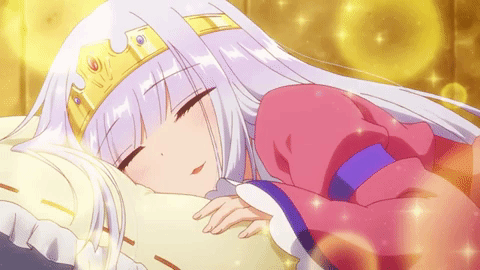
Synposis: The story follows Princess Syalis, a young princess who was kidnapped by the demon king, and her quest to sleep well while imprisoned.
Thoughts: A simple premise for a not so simple story. Sleepy Princess for me was easily the best comedy of the year, with plenty of heart and action thrown in as well. I was wary of the series at first, thinking that the premise wouldnt be entertaining for more than a few episodes, but boy was I wrong. Each episode was funnier than the last and Doga Kobo pulled out all the stops to make it look as gorgeous as possible.
3. Jujutsu Kaisen

Synopsis: Idly indulging in baseless paranormal activities with the Occult Club, high schooler Yuuji Itadori spends his days at either the clubroom or the hospital, where he visits his bedridden grandfather. However, this leisurely lifestyle soon takes a turn for the strange when he unknowingly encounters a cursed item. Triggering a chain of supernatural occurrences, Yuuji finds himself suddenly thrust into the world of Curses—dreadful beings formed from human malice and negativity—after swallowing the said item, revealed to be a finger belonging to the demon Sukuna Ryoumen, the "King of Curses." Yuuji experiences first-hand the threat these Curses pose to society as he discovers his own newfound powers. Introduced to the Tokyo Metropolitan Jujutsu Technical High School, he begins to walk down a path from which he cannot return—the path of a Jujutsu sorcerer.
Thoughts: Originally I wasn’t going to put this on the list, because the season doesnt conclude this year, but I decided to make an exception since the show started so strong. Many people were hyping this up as the next big shonen, and they were right. Mappa really went balls to the wall with this show and I’m pretty hype for what happens this cour.
2. Akudama Drive
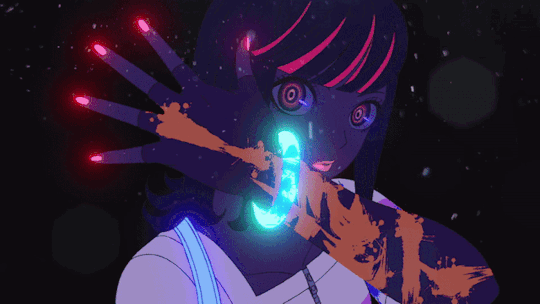
Synopsis: The bustling metropolis of Kansai, where cybernetic screens litter the neon landscape, may seem like a technological utopia at first glance. But in the dark alleys around the brightly-lit buildings, an unforgiving criminal underbelly still exists in the form of fugitives known as "Akudama." No stranger to these individuals, Kansai police begin the countdown to the public execution of an infamous Akudama "Cutthroat," guilty of killing 999 people. However, a mysterious message is sent to several elite Akudama, enlisting them to free Cutthroat for a substantial amount of money. An invisible hand seeks to gather these dangerous personas in one place, ensuring that the execution is well underway to becoming a full-blown bloodbath.
Thoughts: Want to know what it would be like if Quentin Tarantino made an anime? Well here you go. An adrenaline filled rollercoaster ride from start to finish with a crazy cast of characters and even crazier visuals. There’s even a bit of social commentary in there if you squint.
1. Oregairu Climax

Synopsis: Resolved to become a more independent person, Yukino Yukinoshita decides to smoothen things out with her parents, and the first step toward achieving that goal is to prove herself. As graduation draws closer for the third-year students, Iroha Isshiki—the president of the student council—requests a graduation prom in collaboration with the Volunteer Service Club. Yukino accepts this request of her own volition, hoping to use it as a chance to demonstrate her self-reliance, but what lies ahead of her may prove to be a hard hurdle to cross.
At the same time, a chance for the Volunteer Service Club members to better understand each other presents itself. And thus, Hachiman Hikigaya's hectic and bittersweet high school life begins to draw to a close.
Thoughts: The gif says it all really. I could just leave that there and end this list on a somewhat high note, but I’ll explain it.
Now objectively, there were better shows than this one (off the top of my head JJK comes to mind) but when you combine all three seasons there is no contest in my mind that Oregairu had one of the most perfect endings to a series I have ever seen.
It was an ending 7 years in the making. The first season in 2013 was good, the second season two years later was even better, but Climax was Oregairu at is absolute best and that goes beyond the story and characters. A lot of praise also has to go to Studio feel., who took over animation duties from Brain’s Base in season 2. While BB’s animation was much more accurate to the LN, feel’s more realistic designs fit the more mature direction the story was starting to go, giving the anime some of its best moments.
Watching Hachiman, Yukino, and Yui grow and change from naive teenagers to somewhat understood young adults was amazing and sometimes heartbreaking to watch. Hachiman’s search to find something “genuine”, Yukino’s desire to be independent, and Yui struggling with her feelings of love and friendship all clash and compliment in very interesting ways that makes these three characters even more relatable than they were before.
Lots of long running series don’t stick to landing, but in my eyes Oregairu stuck it perfectly. That’s why its my favorite anime of 2020.
Here’s to 2021.
#Dorohedoro#wandering witch: the journey of elaina#majo no tabitabi#talentless nana#itai no wa iya nano de bougyoryoku ni kyokufuri shitai to omoimasu.#bofuri: i don't want to get hurt so i'll max out my defense.#my teen romantic comedy snafu climax#my youth romantic comedy is wrong as i expected#oregairu climax#Deca-Dence#jujutsu kaisen#Akudama Drive#the misfit of demon king academy#A Certain Scientific Railgun T#sleepy princess in the demon castle#maoujou de oyasumi#ID: Invaded#my next life as a villainess all routes lead to doom#Otome Game no Hametsu Flag shika Nai Akuyaku Reijou ni Tensei shiteshimatta...#Bakarina#ikebukuro west gate park#IWGP#Gleipnir#munou na nana#2020 Anime
268 notes
·
View notes
Text
After thinking it over for a bit, I've decided that I might as well do a proper underrated 3DS game rec list. I'm a bit of an ATLUS junkie and that's gonna be pretty disgustingly apparent in this list, but it's not my fault that they released hit after hit and all of them were duly ignored.
Due to tumblr's 10 image limit (and my struggle to keep motivated to do one thing for more than three hours) I'm definitely gonna have to break this up into parts and I'm fairly certain one of these lists is just gonna be MegaTen games lmao but I'd like to let people know about these excellent titles and see if I can't at least get people interested in them so they can get more traction.
So, without further ado:
Some 3DS Games that were criminally slept on (part 1)
Monster Hunter Stories
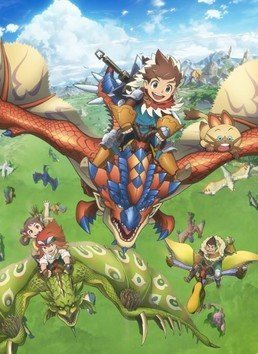
God, where do I begin with this game. Well, the basics: It's a JRPG spinoff title of the now widely successful and popular Monster Hunter series featuring a different take on interacting with the varied and intricate monsters populating the world: Riders.
Yep, instead of hunting the beasties, you play as a young rider who's completed their intiation ritual and can now bond with 'Monsties' as they've cutely labelled the usually ferocious monsters of the wilds. The great thing is that you still fight Monsters--tons of them in fact but this isn't a paid review and in my humble opinion, the most impressive thing about this game is the visual style. The landscapes, the armour, the way they redesigned and 3DS-ified the classically hyper realistic and monstrous beasts to not only be absolutely adorable but still capable of being intimidating when the time calls for it, the stellar animation of special moves and combination attacks--it's delicious, nutritious, stupendous, I can and will consume it like it's part of my recommended caloric intake.
It's very akin to Pokemon in the way its basic gameplay premise is set up, however, instead of catching--or even indeed befriending--the Monsties in the game, you rummage through their nests and steal their eggs, later hatching them and getting yourself a brand new lightly kidnapped monster pal!
Other general things about the game:
Pros:
The armour and weapon sets for both male and female characters slap along with the general character customisation options. They're incredibly diverse (though limited in body type) and you can switch around traits and features whenever you want from your house.
The POGS--these porkers are everywhere and they serve as tiny little achievements for exploring every odd and end of the world. Also they have little outfits. They're so cute. 🥺🥺
You can actually ride the Monsties. All of em. Or, at least the ones that you have available to be your buddies. They all have exploration skills and traits that not only make exploring much more interesting but encourage you to swap out your active Monstie and play around with your options a bit.
Y'all breeding Monsties is complicated and I live for just how intense and ridiculous you can get with optimal builds for these things.
The story is really competently put together! The characters, character designs and even the internal conflict with your starting trio of characters is really compelling along with the mystery of the blight that's infecting Monsters across the world. It's not anything worth awards but it's compelling and it makes you care about the characters if that's what you're in the market for.
Amazing sound design, expansive world, everything about the presentation of this game oozes that Monster Hunter charm even if the art is cutesier than usual. You'll never get bored of its stellar visual presentation!
Available for around twenty quid on the Google Play store, so if you want, you could actually get the full game on your smartphone or tablet. Note though that it would be a battery nuker.
Cons:
If you're on a regular 3DS, frame rate drops are a given. This game kinda pushes the visual capabilities of the 3DS to its absolute limit--a lot like Okamiden did back on the DS.
One save file :( It's pretty much for the same reason as above but still.
If you're playing as the girl, you can't get male armour and vice versa. Since there's only one save file, you'll never be able to have all of the armour sets in a single playthrough and that's criminal because both of the sets for the genders are absolutely breath-taking, thank you.
I 👏can't 👏make👏my👏 own 👏Palico👏
Multi-player for this game is pretty dead seeing as it's almost five years old by now and never got much press or traction. Usually this wouldn't be an issue - this game is 99% singleplayer and you don't really need to fuss about with multi-player to have fun, but if you want to collect all the Monsties, you'll need it since the only way to get Glavenus is through pvp achievements. :/
Final thoughts: Play it if you find yourself getting tired or disappointed with 3DS Pokemon games but still want something that feels as fantastical as Pokemon. It outshines the 3DS Pokemon games at every turn and I will never be over just how thoughtfully put together and fully realised these games are. Of course, if you've ever played Monster Hunter, then you know just how intensive these games are with the lore, biology, cultures and world of their Monsters but seeing that translated into JRPG format was just very sobering and it's a game that, to this day, continues to awe me with just how much love and attention went into it.
Last note: If you're still unsure about it, there's a demo available on the e-shop of the 3DS that allows you to play through the entire initial area of the game. Your data does carry through to the full release and to give you an idea of how much I've been able to squeeze out of it - my playtime for that demo is currently sitting at 22 hours. Make sure to get a hold of that Cyan-Kut-Ku!
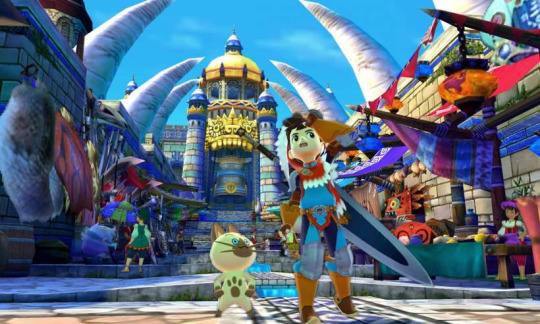
7th Dragon III Code: VFD
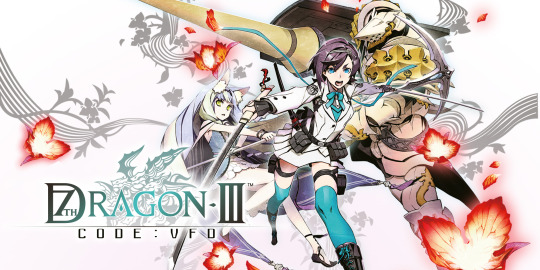
The title may sound intimidating but the premise is not! A mysterious disease called Dragon Sickness spread by the Dragonsbane flowers that have cropped up all around the world. You and your team are recruited by the Nodens game company after you display extraordinary prowess in their hit virtual reality game 7th Encount. As you go through the adventure, you are tasked with finding out the truth behind the Dragon Sickness and asked to stop both it and the Dragons that are destroying the world.
This game is fun. It's another turn-based JRPG however, in this game you create all of your characters yourself from the myriad of classes available to you from the jump. Different classes of course have very different specialisations - Samurai focus on high powered cutting damage with their swords, Duelists are summoners who can influence the element of the battlefield as well as summon monsters from each element, Agents can hack into your enemies and inflict a barrage of nasty ailments, just to name a few - and you are given three teams of three characters each to experiment with different team comps and find the balance that works for you. There's also a wide variety of Dragons to hunt and kill in the game, which directly affects how infected your world is with the Dragon Sickness causing Dragonsbane. Along the way you will also come into contact with many interesting characters, concepts and confrontations that will make the task of saving the world all the more imperative.
Pros
1. The character creator and differing classes give way for tons of experimenting and playing around with your own unique approach to combat and carrying out your missions. Granted, 'character creation' is generous, it's little more than palatte swaps but the classes are really where VFD shines. Eight main classes may not sound like a lot, but the expaniveness of the character skills, their synergy with their fellow classes and the uniqueness of some of the classes in and of itself allows for so much flexibility and creativity in approaches to even tougher bosses. It also encourages the switching about of your party members to really finagle with the options available to you.
2. God this game is pretty. The locations, the character art, the creature design - all of it is gorgeous and this game capitalises on every bit of the 3DS's presentation limitations as it can.
3. You can romance anything and everyone - yes, you can even be gay/lesbian/poly in this game. In fact, one of the main characters - Julietta - is gnc and he's a constant source of joy as well one of my personal favourite characters, right behind Yuma.
4. Exploration is very very forgiving as the game has healing spots and teleport nodes all over the world to allow for quick, seamless travel between quest points without feeling like anything is too much of a hassle. There are also special enemies that allow for quick grinding as well as quick farming of money. In general, the game does a really good job of making sure that the grind is never unbearable or inconsiderate of your time.
Cons:
1. This is the fourth game in a series the West has never seen any other title for, and from the looks of it, will probably never see any other titles for. Because of that, there are some elements that may seem confusing or revelations in the plot that may seem to come out of nowhere.
2. While the visuals are great, the OST of this one is pretty short making for a lot of reused soundtracks that can get really annoying if you're like me and need your audio to be interesting or consistent so it doesn't distract you too much.
3. This one isn't really a con but it is divisive: This game gets pretty difficult at times. A few of the main dragon enemies including and especially the final boss can give you a serious run for your money in the annoy-o-meter in terms of the kind of absolute JRPG fuckery they can pull out of their magic bag of bullshit movesets and while I generally enjoy that kind of thing, I know it's not for everyone. Most regular combat shouldn't be too tricky once you have a team comp that works well together but you also need to pay attention since the same team that carries you to victory one time might be worth beans against another dragon.
Final thoughts: This is... a really good game. Interesting story, really interesting characters, pretty world and a battle system that really makes you sit down and think. There's also a demo for this available in the e-shop and while your data doesn't carry over - you do receive multiple perks for carrying over your demo data including some exclusive items that, while not game breaking, do help a ton in the early stages of the game.
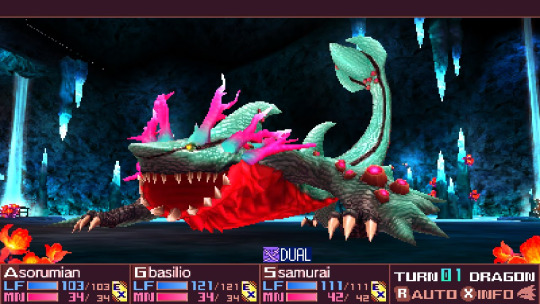
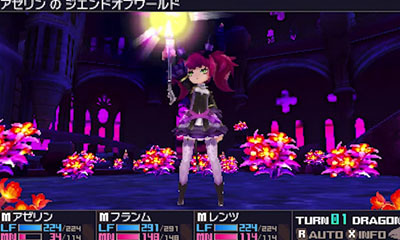
This isn't a final list by any stretch of the word; I only have the energy to do these two right now, but the next games up for coverage are Ever Oasis and Stella Glow! If you're interested in my full plan of games I want to cover here then my current lineup includes: Theatrhythm: Curtain Call, Project Mirai: Deluxe, Culdecept Revolt, Alliance Alive, Radiant Historia: Perfect Chronology, Etrian Odyssey V, Devil Survivor 2: Record Breaker and Shin Megami Tensei IV: Apocalypse.
Finally, if anyone has played any of the games I mention, cover or plan to cover PLEASE REACH OUT TO ME, I AM SO LONELY IN MY FORTRESS OF SAND. On a serious note, I'd love to hear what other people who've played these games think!
Thanks for reading,
-Ginger
PS: @feralpeacock Because a million years ago, on my first underrated games post, you asked that I remember you. :D
#ginger rambles#ginger talks about video games#monster hunter stories#monster hunter#code dragon iii vfd#video games#3ds#underrated games#These take so much energy to make holy shit#There are so many more amazing 3ds games I could talk about#But I legit just don't have the braincells for#Also I know Apocalypse probably has the biggest audience that played it out of all the games listed#But it's criminally underrated because it was different#So it's probably going to get it's own little review thing#Yeehaw
46 notes
·
View notes
Text
M*A*S*H: The Characters, Part 3: Frank Burns, Radar O’Reilly, Maxwell Klinger, and Father Francis Mulcahy
While characters like Hawkeye and Margaret grew and changed, and other characters, like Trapper and Henry, moved on (in one way or another), some characters found themselves doing neither: rather, stagnating, before in a way, moving backwards.
Such is the unlucky fate of Major Frank (Ferret Face) Burns (Larry Linville).
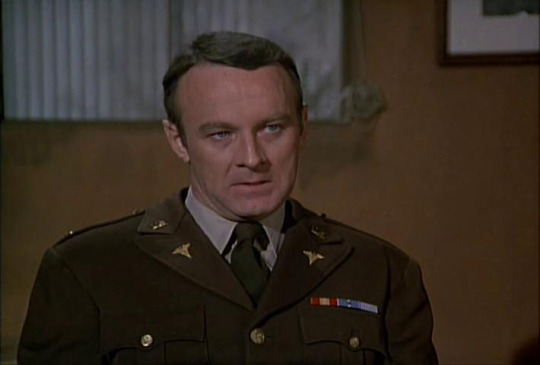
Frank was everything unlikeable about humanity without going quite so far as to be evil. Hailing from Fort Wayne, Indiana, Frank had a wife and kids back home that he didn’t seem to care much for, choosing instead to have an affair with Major Margaret Houlihan, the only other person who could stand his company. A Dr. Jerk if there ever was one, Frank’s lack of bedside manner (and even lack of surgical expertise) could make him a liability, not to mention his incredibly strict sense of military discipline, even when it didn’t make any sense. Definitely The Friend No One Likes, Frank originated as a Foil for Hawkeye, another Gung Holier Than Thou type who put all his faith and trust in the army. Greedy and self serving, and always seeking to climb the ranks, Frank was The Neidermeyer, a huge stickler for army rules and constantly trying to enforce them, but not possessing any of the guts to go with the army worship
And we’re not even close to done with his problems.
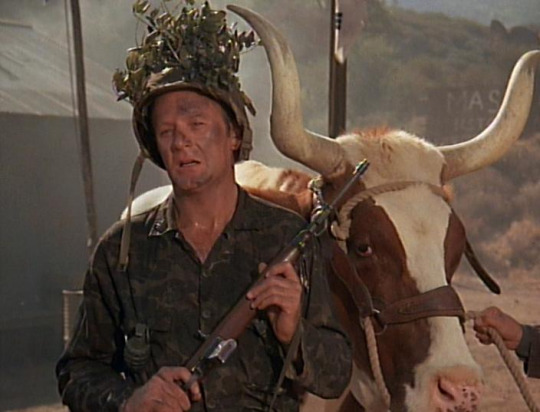
Frank’s job was to represent the dangers of blind patriotism and military fervor. A Leader Wannabe on top of being a Lawfully Stupid Hate-Sink, Frank existed to make mistakes, act childishly, and overall be a thorn in the side of the 4077th. In early seasons, he would often pair with Margaret in order to ‘take down’ whatever operation Hawkeye and Trapper had going, but as time went on, and Margaret left him for her fiancé, Frank became more and more pathetic, and by the time B.J. came aboard to replace Trapper, Frank had lost all weight and depth as a character entirely. His racism and sexism were getting played so ridiculously exaggeratedly, as well as his numerous other flaws, that he was quickly losing any threat as an antagonist, and even his Freudian Excuse of a miserable childhood wasn’t lending him much sympathy.
Without Margaret to back him up, Frank became more ineffective as an ‘antagonist’ character, or even a foil, quickly turning into a universal Butt Monkey and the show’s Chew Toy. With scarce a victory to his name, and quickly turning into a caricature of his own, already exaggerated, character, Frank had nowhere to go but down, devolved to a point of cartoonish buffoonery that there was no bouncing back from. To make things worse, the show was maturing, without him, with more nuanced characters like B.J. Hunnicutt replacing Trapper, and Reasonable Authority Figure Colonel Sherman Potter taking the place of the incompetent pushover Henry Blake, Frank was rapidly becoming lost in a show that was becoming more serious and realistic. As a result, at the end of season five, after Margaret’s marriage, Frank Burns went the way of Trapper and Henry, and left the show: albeit in a completely different way.
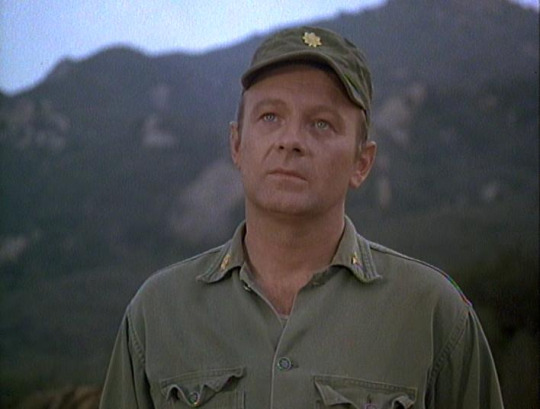
In the pilot two-part episode of season six, Frank Burns goes on leave in Tokyo, and (over the telephone, as Larry Linville doesn’t appear at all in the episode) the audience, and the 4077th, are treated to hearing Frank’s mental breakdown following Margaret’s marriage. After attacking a general and his wife (who resembled Margaret), he’s apprehended, and placed under psychiatric observation, following which he was cleared of all charges, promoted to Lieutenant Colonel, and sent home to serve stateside.
In a way, it was almost a level of gut-punch as Henry’s departure, and a bitter taste of irony. Men like Frank made it home, and were rewarded for their behavior, while men like Henry never got the chance.
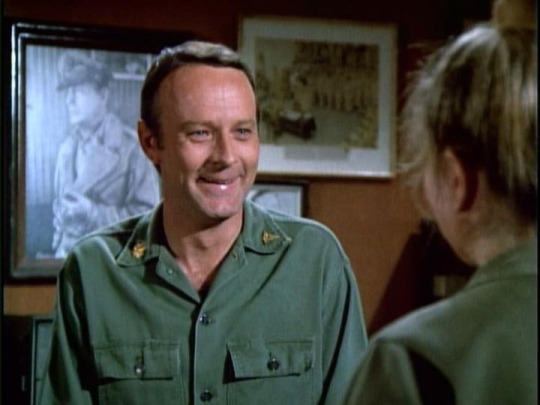
It wasn’t fair, sure. But such is life.
Like Henry and Trapper, Major Frank Burns was never forgotten by the show, or the characters, remembered all the way to the end of season eleven, his absence felt, if not missed, for the remainder of the series.
Which is a distinct dishonor not shared by the last member of the cast to depart before the series ended: Corporal Walter Eugene “Radar” O’Reilly. (Gary Burghoff)
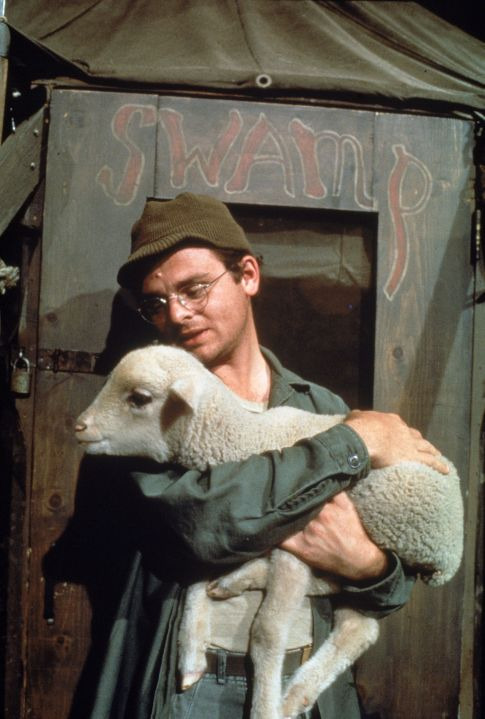
Radar was the company clerk in position, but so much more in practice. The embodiment of the Hyper-Competent Sidekick, Radar was the ‘baby of the bunch’, a naïve Country Mouse from Ottumwa, Iowa with a sneaky streak that showed itself when least expected. The character with the most obvious reason for their nickname, “Radar” had a habit of being able to sense what was about to happen, or what someone was going to say before they knew themselves. Whether he just had exceptionally good senses and reflexes or was mildly psychic, the show never said, but it’s hard to say that the 4077th didn’t benefit from his ability to anticipate the helicopters arriving with the wounded.
Radar started the show as a kid with a worldly streak and a devious side, before slowly losing these traits as the series went on, becoming more innocent and child-like by the time season four rolled around. One thing remained the same though: no matter what, Radar practically ran the 4077th by himself.
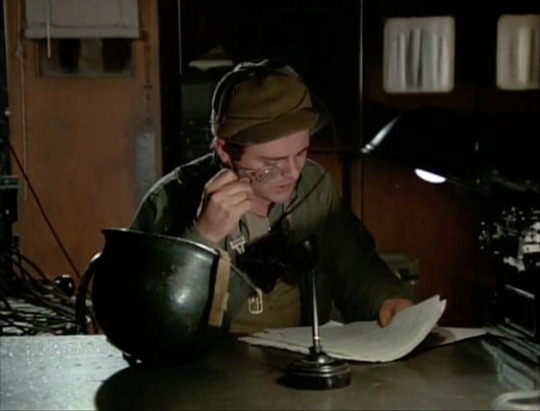
The person in charge of the paperwork, and chiefly the cog in the machine that made stuff happen, Radar’s position as the Scrounger often meant he was responsible for the critical elements in Hawkeye’s madcap schemes (in early seasons especially). Radar was always the centerpoint of competency, (the sole one until Colonel Potter showed up) despite his own quirks: sleeping with a teddy-bear and abstaining from alcohol (mostly), preferring grape Nehis, and caring for every animal that happened to cross his path. In fact, Radar’s chief Berserk Button (besides his height) was anybody harming any animals, to the point where he ended up rescuing the lamb meant for Easter dinner and shipping it stateside, not to mention his explosions of temper at the thought of Hawkeye killing his rabbit to perform a pregnancy test.
Radar tended to follow along with whatever Hawkeye and company were up to, sometimes begrudgingly and sometimes willingly, depending on the situation, always relied upon to make necessary calls and deals, file necessary paperwork, and fill in wherever necessary. In return, the rest of the unit filled in as ‘family’ for Radar, though never replacing his mother and uncle.
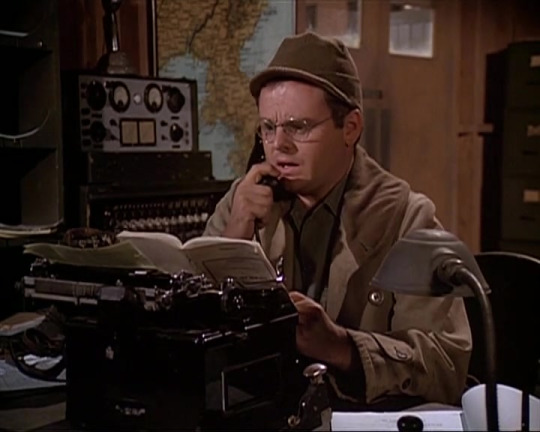
Despite his varying levels of immaturity throughout the seasons, Radar did grow up, and out from under his 4077th family (especially father figures Henry Blake and Sherman Potter). Early in season eight, Radar got the news of his uncle’s death, leaving only his mother to take care of the family farm, and received a Hardship Discharge. He got to go home.
And go home he did, although with mixed feelings about how the 4077th would get on without him. Behind him, he left the symbol of his immaturity: his teddy bear, which would later be buried by Hawkeye in a time capsule in “As Time Goes By”.
“This is my contribution. Radar left me this. Let it stand for all the soldiers who came over here as boys and went home as men.”
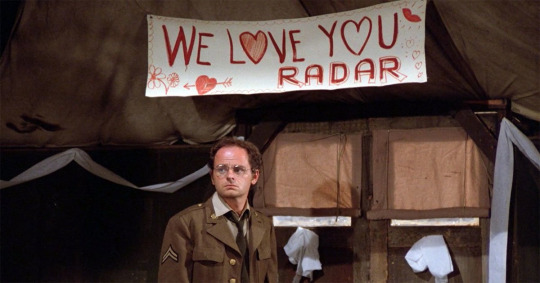
Like with Henry (also honored in “As Time Goes By” with his fishing lure), Trapper and Frank, Radar’s departure was felt by the characters, and referenced often. Unlike Henry, Trapper, and Frank, however, Radar wasn’t replaced in the cast. At least, not by a new cast member.
Instead, he was replaced by a fellow corporal, Maxwell Klinger (Jamie Farr).
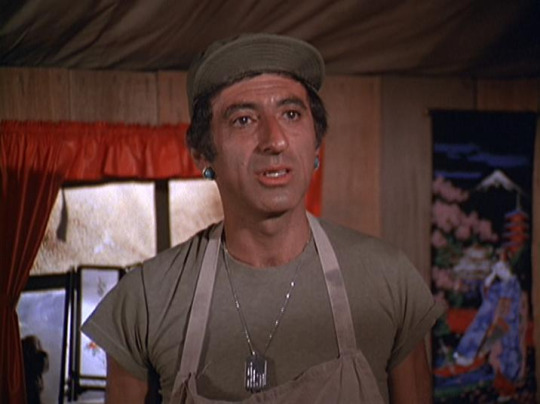
Klinger was a bit of an anomaly in the M*A*S*H cast in that he had no book counterpart from which he sprang: he was all new, added entirely for the television show. Hailing from Toledo, Ohio, Max Klinger’s primary character trait was a loathing for the army that manifested itself somewhat differently than it did in the rest of the camp.
Whereas Radar was content to complain, and B.J. and Trapper fine with moderate actions of rebellion, or even Hawkeye settling for vocal disapproval and the occasional mental breakdown, Maxwell Klinger chose to express his displeasure with the draft by doing everything humanly possible in order to get out of the army: specifically by being declared clinically insane.
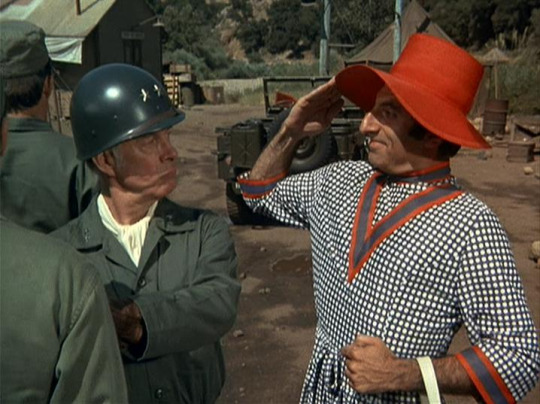
Throughout the eleven years he spent on the show, Klinger tried everything from wearing women’s clothing to pole sitting in an attempt to get a Section 8 discharge, a pass out of the army. Medical conditions, family emergencies, wearing heavy coats in a heatwave, sneaking out in a raft, hang glider, or a hearse, Klinger’s schemes regularly made up the subplot of a typical episode of M*A*S*H as he attempted to find a way to escape the military. (Oddly enough though, his schemes never got in the way of his duties.)
Klinger started out as a one-off joke character early in the first season, played deliberately in a stereotypically effeminate way. Originally meant to appear in only one episode, reception to the character was incredibly favorable, and Klinger was added to the recurring main cast, going through a little bit of a change. Actor Jamie Farr suggested that Klinger be a straight man who was just wearing dresses as though they were his uniform, and the matter-of-fact use of his unconventional wardrobe quickly became part of the character’s normal routine, looked on as perfectly normal by all except the antagonistic characters.
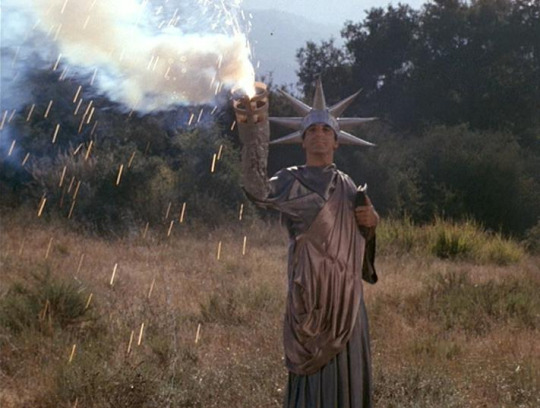
Despite starting as a one-note joke, throughout his time on the show, Klinger grew, just like the rest of them.
While never losing his intense hatred for the military and desire to get out, as time went on, Klinger became more rounded, expanding from just his ‘joke’ personality to having a larger one, demonstrating a deeply caring streak multiple times, notably when he gave Margaret his wedding dress for her marriage to Donald Penobscott. Throughout the show’s run, more time was given to develop his other attributes: his hard-luck background, his long-distance wedding and divorce, get rich quick schemes, a feud with supply Sergeant Elmo Zale, and his fears that he may actually be going crazy, explored in “War of Nerves”.
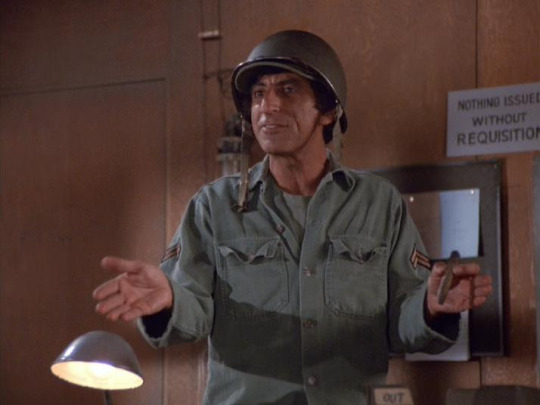
In season eight, right after Radar O’Reilly left the show, Klinger found another place on the show: replacement clerk and Scrounger.
At this point, Max’s character shifted slightly, away from the zany schemes and Obfuscating Insanity. He quit most of the section-8 schemes, notably the women’s dresses, entirely, but remaining a Guile Hero with Hidden Depths, without rescinding into the background. Initially finding it very hard to take over for the seemingly-psychic Radar, eventually Klinger settled into his new role, even getting promoted to Sergeant, before the end of the show.
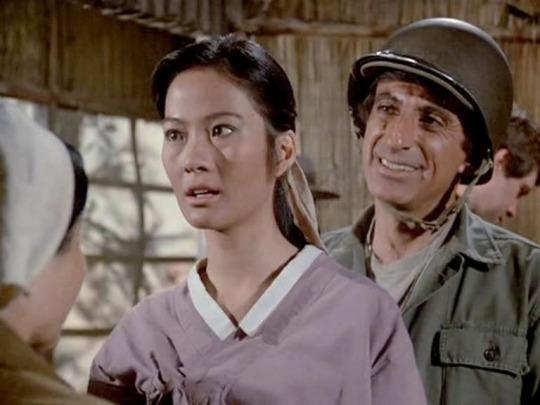
And what an end.
In “Goodbye, Farewell, and Amen”, after the war has ended, as everyone packs up to go home and says their goodbyes, Klinger makes a completely astonishing announcement: he’s staying in Korea, with his new wife, Soon-Lee. After all of that effort, all of the crazy things he’s done, from trying to eat a jeep to trying to get into West Point, when he finally gets to go home, he chooses, instead, to stay.
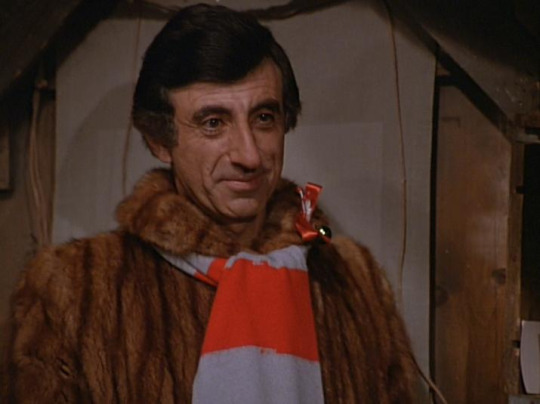
Over eleven years of show, Klinger went from a Fashionista Determinator set on getting out of the army to a clerk and sergeant, who made the decision to stay in Korea to help his wife find her family. Now that’s what I call growth, especially being one of the only characters who was there from start to finish.
In fact, there’s only one more of those we have left to discuss:
First Lieutenant Father Francis John Patrick Mulcahy (William Christopher).
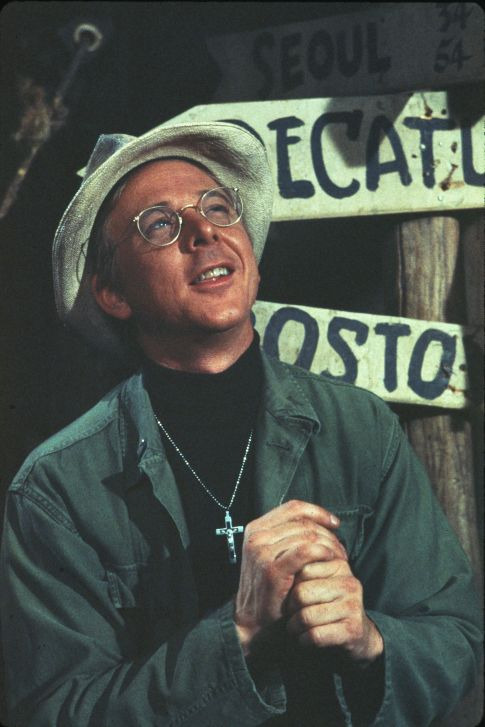
Father Mulcahy is the 4077th’s chaplain, a dedicated and devout Catholic priest, and the unit’s moral compass. Although a pacifist by nature, Mulcahy was an amatuer boxer, and occasionally demonstrated flashes of righteous fury paired with Good Old Fisticuffs.
“He’s shy, and studious, and yet he has a right hook that could stop a truck.”
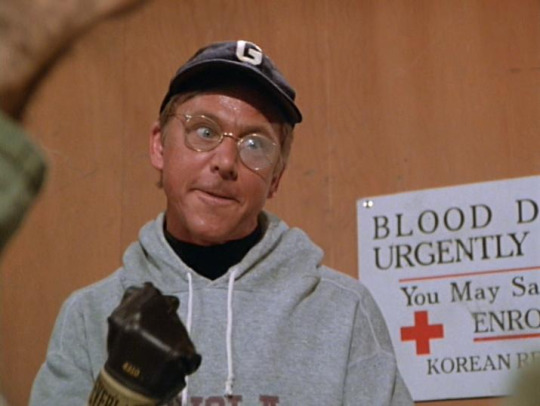
The show’s quintessential case of Beware the Nice Ones, and another Deadpan Snarker to round out the cast, Mulcahy tried to make himself useful wherever he could, often struggling with feeling like he barely contributed to the assistance offered by the 4077th.
Mulcahy and Radar often occupied the same position as the Only Sane Man in the camp, but while Radar would typically crumble under pressure to participate in whatever chaos was going on, Mulcahy tended to be aware of it, but not exactly involved in it. He was the Heart, the McCoy, a Determinator who wanted to do the right thing, at all times, focusing on his job and trying to make a difference for the better in the camp, and the war at large.
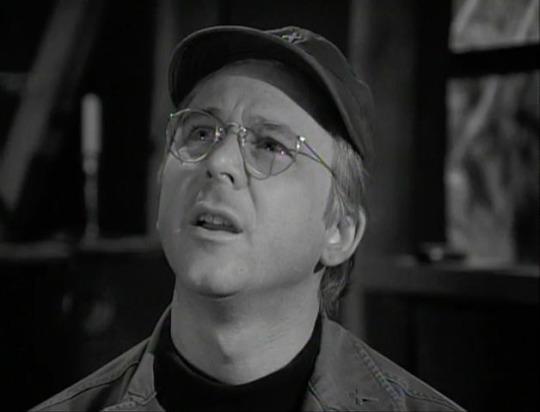
“When you lose a patient, he’s out of his misery. When I lose a patient, he’s lost his soul.”
Oddly enough, for an irreverent comedy show, Mulchay was portrayed as a good man of the cloth, a genuine person who was deeply faithful and religious, without any ‘parody’ elements or ‘joking’ instances of corruption. Mulcahy practiced what he preached, constantly trying to help those around him, notably the nearby orphanage (with the winnings of the poker games that he always seemed to win). He was no Load, and no ‘stick in the mud’, by any means, being a moral character who tolerated Hawkeye and company’s shenanigans in good humor, but had no qualms about calling the rest of the camp out when it was needed. Overall, although not developing too much throughout the show, Mulcahy was a steady constant with Hidden Depths, a much-needed upstanding character who openly displayed the courage and kindness that other characters often hid with jokes.
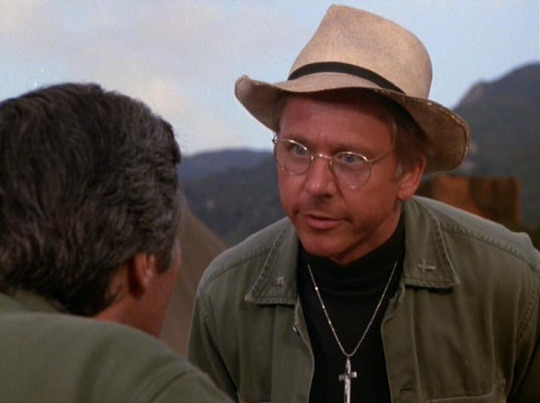
And in the end, Mulcahy got to go home too.
Like with the others, Mulcahy left Korea a changed man, visibly shaken by the horrors of war, and physically changed as well. During the finale episode, “Goodbye, Farewell and Amen”, while rescuing prisoners-of-war in the path of an artillery barrage, a shell explodes very close to him. Although Mulcahy survived the incident, he did so at the loss of most of his hearing, something that only B.J. finds out about. Mulcahy returns to the states, intending to work with the deaf, but not before saying goodbye to his 4077th flock:
“I’ll miss hearing confession, but after listening to you people for so long, I think I’ve just about heard it all.”
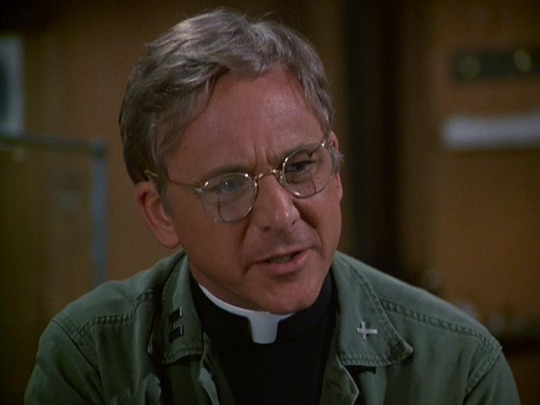
Mulcahy was the last of the main cast of characters to have begun appearances in season one, and one of only four main characters to last throughout the entire show (Hawkeye, Margaret, and Klinger being the other three), but by no means was he the last character we have to discuss. After all, for all the characters who faded out, new characters faded in to take their place, bringing their own unique color and personality to the positions they now filled.
(Join us next time, where we’ll discuss Sherman Potter, B.J. Hunnicutt, and Charles Emerson Winchester III!)
#M*A*S*H#70s#TV#Television#TV-PG#Comedy#Drama#War#Alan Alda#Loretta Swit#Jamie Farr#William Christopher#Wayne Rogers#McLean Stevenson#Larry Linville#Gary Burghoff#Mike Farrell#Harry Morgan#David Ogden Stiers#Larry Gelbart
13 notes
·
View notes
Text
So, Detective Pikachu.
It was really good! While I’ve always enjoyed the first Mortal Kombat movie for what it is, and the Double Dragon and Street Fighter movies are entertaining in their own rights despite having nothing to do with the source material, I think Detective Pikachu might be the first actually good Hollywood video game movie.
It does have a few issues, but they’re all relatively minor. While the CG is great most of the time, there are a few Pokemon that don’t look great, or even feel like they don’t really exist in the scene. I was concerned by a group of Loudred surrounding a DJ in the trailers, as in the movie itself... yeah, they look pretty bad. Make no mistake, they’re actually utilized SUPER well: you can’t tell from the trailers, but during the entire scene they appear in, they’re beatboxing and creating the music you club music you’re listening to, and it just clicks in a really cool way. Unfortunately, the CG on them just looks smudgey and unconvincing.
I noticed the same issue on other dark-colored Pokemon too: Gengar, Machamp, and Snorlax all stand out a bit. Maybe it’s because their colors feel too saturated for how dark they are, I’m not sure, but unlike most other Pokemon in the movie they stick out whenever they’re on-screen. Thankfully, all the rest work well, and look great. Pokemon with cartoonie white eyes with a little black dot pupil look weird at first, but that was no longer an issue for me once I realized that they were actually depicted with normal eyes, just with completely white irises. It’s subtle, but actually really clever.

Another weird quirk of Psyduck’s design are those three... hair things, on its head. I can appreciate that they wanted to stay close to the original design, but I really wish they’d been depicted as feathers or something, because with the texturing on them, they just look like weird little hair-covered antennae or something. It’s really weird. I have no complaints about the rest of the Pokemon though, and some, like Snubbull, are legitimately amazing.
Anyway, enough complaining about CG, let’s talk story! Being a mystery, there ARE a couple plot twists, one of which I figured out, another that the movie actually manages to keep from you pretty effectively (while still making sense in context), and one that I was completely not expecting because the movie intentionally misdirects you. That’s a pretty impressive number of twists, given the movie’s short run time.
Unfortunately, the length of the movie also means that a few things feel rushed... the villain enacting their evil scheme kinda comes out of nowhere, and I feel like not nearly enough was done to set that up. This comes after a big action scene that I feel could’ve been greatly scaled back, especially considering the ending is also a big action scene... Don’t get me wrong, the [REDACTED] this movie does is on-point and I wouldn’t want them to change that, but the reality of what the villain is trying to accomplish really should’ve been explained at some point.
The writing itself, however, is really funny, snappy, and at times heartfelt, with great performances all around. There’s a slight issue in that all the best jokes are used in the trailers, but obviously that’s not the movie’s fault, and in a theatre full of people who haven’t watched them a dozen times there would probably be a fair number of laughs. It’s also surprisingly adult. Like, legitimately, I’m shocked that some of the jokes alluding to nudity, masturbation, cocaine, and Pikachu being violated were approved. You definitely think I’m kidding right now. I am not.

The Mr Mime scene is also a lot different than I was expecting based on the trailers, and is... well, I won’t spoil it in any capacity, but I’ll just say that it’s another of the scenes that I wish had gone on for longer.
One of my favorite parts of the movie is the female lead Lucy, because she’s... an actual person? She’s not JUST a love interest, she’s not quirky and bumbling to the point of being comic relief, and aside from being shown to be slightly athletic at one point, she’s not hyper-over-competent either. It probably says a lot about Hollywood movies that I consider depicting women as normal people to be a selling point. She’s kind of a cliche character in that she’s a journalism intern hungry for a scoop, and isn’t super well-developed, but as I’ve already mentioned that this movie has a lot to cram in.
One thing I was never really clear on is why Lucy has a Psyduck. In Ryme City, catching and battling Pokemon is outlawed, and everyone has a partner Pokemon to help with their daily activities. For example, Bill Nighy’s character has a Ditto that acts as sort of an assistant, assuming whatever form is needed. A street vendor has a Charmander to light his wok, a cafe owner has a Ludicolo as a waitress (presumably to carry cups on its lily pad thing)... but I’m not sure why Lucy has a Psyduck. I guess just because Psyduck is recognizable to people who watched the original series of the Pokemon anime? If there’s an in-universe explanation, I completely missed it.
If there’s one other thing I’d like to have seen in the movie, it’s Wooper a wider selection of Pokemon. I know that it’s a ridiculous amount of work to make even one CG creature for a movie like this, since they have to design it, animate it, and do a ton of tedious work like making sure that the lighting looks realistic in every single shot, but still. Towards the end of the movie, you really get a feeling that the Pokemon you’re seeing are being pulled from a limited pool, which is unfortunate. It reminds me of the very first Pokemon Stadium game, in which only something like forty Pokemon are available to use. Here’s hoping that the sequel (which is already confirmed to be happening) introduces a lot more, and does more world-building. I’d love to see what they can do with a full two hour run time in which they don’t have to establish the premise or introduce characters, devoting everything to telling the story.
23 notes
·
View notes
Text
An anon asked me what my favorite aspects of Yuzu’s personality were, so I went off a little under the cut. Uh...sorry. All thoughts are my own.
Oh man. I'll answer this a bit differently than I usually would because I think a lot about how he has characteristics that /could/ generally be considered character flaws, but actually make him much more interesting and fascinating in my eyes. So I’ll skip some of the usual obvious reasons to love Mr. Extra, and dive a ‘lil deeper.
1. (This is very biased since I don’t pay attention to other athletes as much as I do Yuzuru (yet), soz) His hyper-competitive, hyper-focused nature. Obviously you could argue that every athlete possesses it, but I feel like Hanyu takes it to a different level, very often. The headspace he gets into during 6 min warm up, (or the stance he takes when the final 6 skaters line up on the ice and his name gets announced, him raising his arms to the crowd with his head held high, but seemingly unaffected by the deafening cheers, eyes serious and even dangerous in a way, out for nothing less than the gold), could be considered pretty scary, or to some (youtube comment sections are a gold mine) even rude and unnecessary. To me, those are some of the most intriguing and incredible moments to watch him, because that’s him, playing everyone, probably even himself, by creating an air of confidence that you cannot help but absolutely believe in. This unwillingness to show vulnerability or weakness, even if he may well be very vulnerable at that one moment or another, depending on whichever competition he's doing, because we all know better lol. He has an armor of steel and he knows exactly how to play his cards, he’s psychologically intimidating, as if all he has to do is flip a single switch in his head, whenever the situation demands it (rip dima who accidentally caught his eye at CoR lol poor bb).
2. That brings me to my next point. His utter level of calculation and strategic thinking. I have a huge laugh everytime people, especially antis, underestimate him, physically but especially intellectually. Sometimes you look at him goofing off at practices or galas or him falling on his butt for absolutely no reason off ice, he’s our fave meme lord after all, but if you watch a single interview, you get reminded again what's really stored in that noggin of his. And it's astonishing if you consider this is a 23-you kid, and also that he's always been like this, on one level or another. It's pretty mindblowing how far ahead he is for his age, just on a human emotional scale, and how he takes time to gather his thoughts, to consider every side and aspect of a topic in his mind before he answers questions, how he tackles being the center of the media and an idol (he’s an athlete first, I am aware, but at this point it is undeniable that his public significance and position is exactly that of an idol/megastar) for an entire nation. That takes some nerves and endurance, i don’t know how he does it. As Javi said, his brain is pretty good.
3. I love how unashamed he is about wanting and needing to be on top of his sport. He doesn't down-play it either. He will lift his finger into the air after a good skate and declare right then and there that he's won, even if he hasn't even seen his score yet. He is, in a way, a narcissist. And he loves it, too. He knows he is the best and he will be undefeated no matter what, if he delivers the skills he has trained so hard to possess over the course of his life, with all the obstacles that were and keep getting in his way. He will tell you to your face that he's better than you and will beat you next time if you beat him at a competition (rip pchiddy). He doesn't even hesitate. And people could and probably will call this arrogant or him being full of himself, but. That's never it. It's oddly, very humble and truthful, in my opinion. There is no actual hot-headed arrogance or greedy superiority there. It's simply a matter of fact. He can be a cocky bastard sometimes, oh yeah he can, don't get me wrong, but he Gets to be one. He’s earned it. And I actively celebrate when he is being a brat like that, not even gonna lie. He deserves to be. Where with most people this aura would probably bother me, with him, it makes him just more fascinating as the multi-layered person he is.
4. So then, in direct contrast to this, you also have the exact opposite of that personality trait? The constant need to mention the masses of people that support him at all times. The fact he never forgets to mention that without the people watching, supporting and also competing alongside him, he would not be here, where he is right now. His soft tone when he speaks about Javier's influence on him, or when he literally had never ending face spasms and a skin breakout from nerves when Pl*shy praised him at CiONTU lol. The fact he doesn't neglect talking about the fans that cannot afford to see him live, including his international fans, everyone who supports him from home, he knows it and he publicly acknowledges it, because he cares. His deep, deep adoration for other athletes, or just people in general that try their best and work hard. His reverence, utter sadness and respect when he talks about 3/11 and how it impacted everything in his life, the ridiculously amazing amount of money and awareness he’s raised for the victims, the battle within himself afterwards, questioning if he’s “allowed” to keep chasing his own dream under the aspect of disaster striking so many people. His heartbreaking dedication to the sport itself, but also what he wants to express by skating (i.e. Requiem). The fact that he’s always stayed with both feet on the ground, and how he’s (outside of “competition-mode” on ice) always very soft, humble and grateful to others, and never ever acts superior or above others. His sportsmanship in general. The fact he cares so much about people. He overcomes obstacles that would have finished me 100 times over. He is so, so inspirational. His heart is golden. He claps his own thigh when he’s made an awful joke. He can’t walk properly when he’s off the ice. He’s obnoxiously perfectionist, which is so relatable. He’s a big old softie, that loves bear hugging like, everyone. His complete awareness of every single thing that carries meaning in his life and what got him to the place he is now, his will to overcome every hardship and come out stronger. So, so many aspects, so many layers. I love he.
54 notes
·
View notes
Text
RWBY & Cinematography, Part 1 - Establishing Techniques
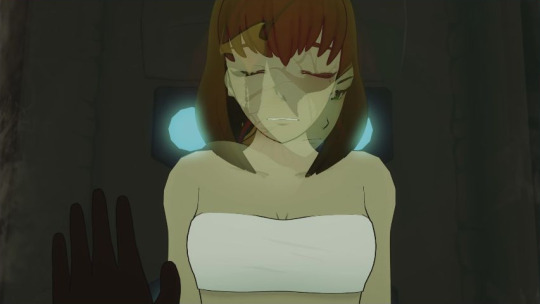
Animation has for a long time now struggled to crawl out of the stigma of appealing only to a younger audience. Combine that with internet animation in particular being very young compared to other film-making mediums, and you have projects within the platform that need to go through much trouble to make a name for themselves. RWBY is no exception to this, as from the beginning it has faced a lot of harsh ridicule by critics who are fans of anime, the very medium the web-series takes direct inspiration from. And despite having a growing fanbase and the production having come a long way in just five years, there are some aspects of the show that even much of its fans have neglected to refer to. If there’s one growing part of RWBY’s presentation that especially deserves mention. it would be the cinematography.
As stated previously, RWBY has always been inspired by and even aimed to emulate anime. As a cultural medium of entertainment, anime has been the pigeon-holed for its various tropes. The tsundere archetype, beach and hot spring scenes, shonen training arcs, transfer student character introductions, etc. And while the dismissal of seeing some the same tropes in many titles every season, every year is understandable, anime as a visual-storytelling medium has been cultivating itself for the past 60 years. With that much time, many names who have taken the positions of directors and storyboard artists in their careers alone have developed recognizable cinematic techniques. One example is Osamu Dezaki. Most may not have even heard of him due to his passing in 2011 or his works due to how old they are. But one may faintly recognize his techniques he pioneered that are casually sprinkled in many anime. Take the “postcard memories” technique for instance, a way of freeze-framing a shot into a hyper-detailed, sketchy still. It’s something meant to make the subject of such shots feel especially tense, mesmerizing or impactful and it can be seen in various works that some fans today have been exposed to like Sailor Moon, Kill la Kill, & One Piece.

And Dezaki is just one name that uses certain techniques to create a vision in anime titles. There are many others who have gone to either provide storyboards for or direct some shows and films well-known within anime fandom to this day. With Takuya Igarashi, the director of Ouran High School Host Club, Soul Eater, Star Driver, Captain Earth and Bungo Stray Dogs, his works commonly have vivid colors and lighting through windows and characters on symmetrically-opposed sides to convey the contextual mood. Then there’s Shigeru Yamauchi, the director of Casshern Sins, Dream Eater Merry, A Town Where You Live, the 8th, 10th, & 12th Dragon Ball Z films, Digimon: The Golden Digimentals, and a storyboard artist of episodes of many, many anime. Yamauchi is especially known for having whole scenes depict close-up shots of a character’s face or showing half of their bodies and having settings be done in a specific, sometimes monochromatic color schemes that feels like something out of a painting. There’s also Naoko Yamada, a name from studio Kyoto Animation who has developed a resume of directing shows and films like K-ON, Tamako Market & A Silent Voice that, despite them mostly having a moe vibe through the character designs, are deceptively-enriched in scenes shifting from bright, pastel colors to more dull colors to provide atmospheric moods and having characters express themselves not through their faces but other ways such as their legs.
There are far too many names to point to, but even ones who have yet to direct a whole anime, manage to apply their cinematic ideas into episodes of anime. Even something like Dragon Ball Super, a recent installment of a popular shonen franchise that’s often dismissed for having characters mindlessly flying and throwing beam blasts and fists, can be known for having episodes with competent stage direction depending on who is working on it.
With all of that said, it’s worth bearing in mind that RWBY, like the many anime it takes inspiration from, could also be credible for having and applying cinematic techniques. But this wasn’t always the case. Back in volumes 1 & 2, the process for storyboards would be led by Patrick Rodriguez, who is known for designing various characters in the show like Ironwood, Amber, & Tyrian, with the rest of the team consisting on Miles Luna & Kerry Shawcross, the writer and director of the show respectively and the animators. The problem however was that even with the storyboard team set up this way, scheduling was very tight, to the point where there was either little time or no time to make the boards for the show. Although the first two volumes were not entirely void of enticing shots, this led to needing to resort to basic camera shots and on few occasions, incomprehensible ones. By volume 3 however, this process changed. Among the many changes in the production pipeline, one of them was the overhaul of the storyboard team to be led by Joe MacDonald, an animator during volume 2 who had nearly 30 years of experience in the creative entertainment industry, with a newly established team consisting specifically of storyboard artist. The second was introducing a complimentary camera & layout team, also led by Joe MacDonald with some of the storyboard artists overlapping. Finally, the third was creating a camera bible. To quote from one of the storyboard and layout artist, Rachel Doda, in the volume 3 audio commentary:
“It was mentioned earlier too in some other commentary, but we originally created like a camera bible or at least tried to create like, stage direction in terms of just… hey! Ya know, If it’s a shot of Ozpin, it has to be kind of stagnant because he’s the most level-headed. And if it’s a shot of Ironwood, usually, they just, ya know, it has to be like he’s in power. So the camera has to be low to the ground. Then, ya know, just like all the characters themselves. Qrow has a little hitch to stuff.”
Since volume 3, the camera served as was a big way to help express the position or mindset of various characters. Take the character, James Ironwood as referred to earlier. Compare most of his shots in volume 2 to his shots in volume 3 & 4, and the differences in his scenes will feel more apparent. Camera manages to communicate when he feels it’s important to be authoritative and when to be more reasonably submissive. And that’s the key word: “communicate.” If Rachel Doda’s words as quoted are of any indication, then multiple elements in cinematography such as lighting, color, transitions, framing, staging, & character posture could be at play to sell and help deeply interpret meaning behind character’s thoughts and intentions.
In the case of volume 3 where this major shift in the show’s direction began, there are several scenes that became very striking to this day. One of the biggest examples is this shot of Pyrrha witnessing the Fall Maiden, Amber in a comatose state in chapter 6. When watching it the first time, one may think that match-cutting from Pyrrha turning away to showing Cinder at the stadium is simply meant to indicate that Cinder is Amber’s assailant. But there’s also a matter of Pyrrha feeling bound to take a risk of having her destiny be Amber’s and not hers compared to Cinder who wants nothing more than to become the very thing the former hesitates to be. Pyrrha feels she can’t avoid any of this and is thus overwhelmed as shown in chapter 8 when she can no longer even attain peace of mind from a simple leaf falling towards her in a burning sunset, all of which from that point on referred to the Fall Maiden in her mind.
Though as much as volume 3 had its strong sense of visual direction, RWBY’s fourth volume arguably pushed the direction further through a variety of ways. While it has been criticized for spreading its story too thin by jumping between multiple plot points, some scenes in plot points tied to certain characters can contain some strong cinematography. Take for instance Cinder’s training scene in chapter 11, which by itself doesn’t seem to say much. But think about the Grimm she fought. They were a bunch of Beowulves and a Beringel, which are the same creatures of Grimm that Ruby Rose fought in the character short. Although Ruby takes longer to defeat her foes than Cinder, the former is shot to end her fight triumphantly while the latter is shown exhausted and has to catch her breath after her bout. All of this can be interpreted as an inadvertent way of presenting how even more salt is poured to Cinder’s wounds.
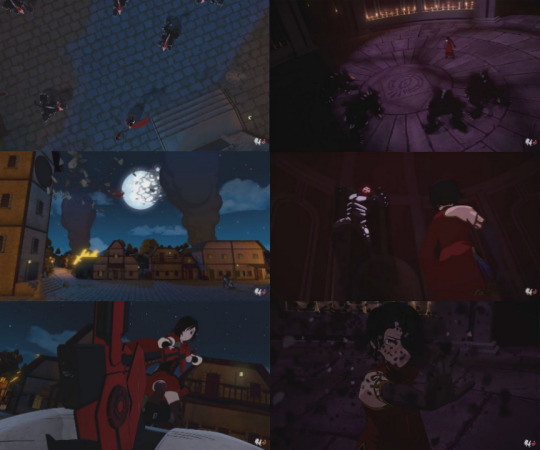
Another example in volume 4 are scenes of Weiss in the Schnee mansion in chapters 2 & 11. When comparing side-by-side, the shots themselves are practically the same but with three key differences. The first is the lighting, the second is Weiss’s facial expressions and body language, and the third is the fact Klein is accompanying her in the same shots in chapter 11. These shots show very effectively-opposite meanings with Weiss’s character who is first seen feeling lonely and submissive despite being in a fancy, spacious, brightly-lit home only to be feeling more defiant and at-ease when she has Klein to help her escape the home we learn she hates.
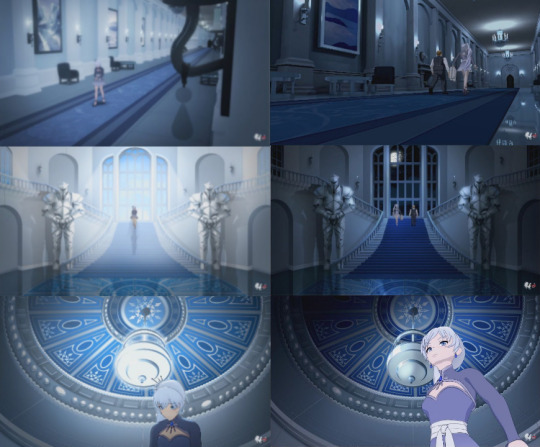
It’s this use to linking shots in different episodes that also sheds light to the context of the song “Mirror, Mirror”, which frankly never made much contextual sense up until this point. How can someone who carries pride in her family name be the loneliest of them all as the lyrics go? Well, this visual direction sums up why. Her father and his business-oriented ambitions created a growing rift in her family and she needs someone she can trust to be empathetic towards what she’s feeling. This is also why she felt hurt when she found out Whitley never really intended to look out for her. Combine these moments with shots of her witnessing the Atlas ships passing by her window in chapters 1 & 7, only to finally manage to leave in one by chapter 12, and you have a phase of Weiss’s character story packed with meaning.
There’s also quite a few cinematic techniques regarding Qrow in volume 4. One of the biggest cases is the use of a low light by his side with whoever he talks to about Salem. In times where connection to other Kingdoms in the World of Remnant are cut-off, Qrow welcomes or advises cooperation with other characters out of necessity. Warm lights such as lamps and campfires help illustrate this. With Qrow and Raven in chapter 4, the lamp on the table is closer to the former than the latter who only wants specific information and will otherwise walk away (or make a portal in her case) towards the darker side of the Tavern. And then there’s chapter 8, where Qrow informs team RNJR with as much information about everything to do with Salem and the fall of Beacon as possible, leading to well-presented shots of Jaune stepping briefly outside of the campfire due to his anger and wavering trust. Even this shot where he bluntly referred to Qrow’s motives as using his teammates as bait is framed to show his stance on who he was looking out for and who he wasn’t. Most interestingly though, is this shot here of Qrow framed to be surrounded by the campfire as he describes his semblance. While the cinematic techniques in some scenes can be admittedly up for debate, this shot was actually confirmed by Kerry Shawcross in the volume 4 director’s audio commentary to have been drawn by Rachel Doda and was highly approved after going through every department in the production.
“We uh, the shot inside the fire, was definitely one of the shots that we had uh, Rachel had the idea to do while we were boarding, Rachel Doda. And uh, I told her, “absolutely draw that! I make no promises that’s going to make it all the way through. But every next department after that I explained the shot and it was like, “no, we should do that!” Um, so yeah, it was one of those things where it was like, it was just such a beautiful shot that everyone wanted to make it happen and everyone went out of their way to make it happen.”
One of strongest cases of visual techniques applied though was in the forest scene in chapter 2. Here, we see Jaune, an often talkative character in previous volumes, be unusually silent and uttering only shouts and out-of-breath exhales as he trains through Pyrrha’s recording. He is mostly alone in the dark forest with shades of dark blue and green and bright, blueish lights illuminating his armor. Most fans who see this scene are struck by the music and Pyrrha’s words and Jaune’s determined, yet saddened facial expressions. Alone, those aspects are effective at the scene being a tearjerker. But there’s one other element, a visual one that can add a whole level of meaning: the fireflies.

In Japan, fireflies are theoretically that of Hitodama or “human souls” drifting in the night when away from their bodies. If we were to apply this motion to the forest scene in chapter 2, then the fireflies could be visually representative of the lives lost in Shion village. Thus what Jaune could’ve felt was not sadness for not being able to stop Pyrrha, but for being unable to do anything about tragedy of the villagers. Now to some, such an interpretation may be considered reading a little too much. While that response is fair, bear in mind that the villages seen in volume 4, Shion, Higanbana, Oniyuri and Kuroyuri are all named after flowers with specific meanings in Japanese, the matter of fireflies being that of human souls may not be that unlikely.
“I’m just tired of losing everything.” - Jaune Arc
If there’s any set of scenes that are arguably as striking in visual direction as in chapter 2, if not more-so, it would be in scenes of Ren and Nora in chapters 10 & 12. There’s the matter of how the reveal of Ren’s semblance after cutting from the shot of the lotus flower is representative of how a real lotus flower can bloom after being submerged in mud. There’s also the shots of Nora desperately holding on to Ren’s hand, one of which is out of fear of being left alone when they were kids while the other is to prevent Ren from risking being killed due to anger and reckless abandon. But probably the most powerful moment of stage direction is of this moment here.
youtube
That there concisely explains what Nora means to Ren. Bear in mind, Ren is a very quiet, calm & collected character. He’s the opposite of Nora in that regard, who wears her enthusiasm on her sleeve and openly express how much she enjoys Ren’s company. But up until this point, we hardly seen Ren’s perspective about Nora other than the occasional subtle smile at her antics. It’s not until the scene underneath the house in chapter 12 that we see what Ren sees when Nora is deeply saddened to the point of being in tears, something viewers have never seen her current express before. In his mind, Ren briefly sees the same frightened girl who he first met and swore that they would keep each other safe. He is all Nora has and if he realizes that if he gets himself recklessly killed, then she’ll be alone all over again. And that’s the last thing Ren wants to happen.
Even after all of this is said and done, there’s still more examples of scenes with visual direction to be unpacked and interpreted in volume 4 alone. But those can be talked more depth another time as they help compliment scenes in the focus of the next subject to be talked about in part 2.
#rwby#rwby6#rwby analysis#crwby#rwby5#cinematography#storyboards#rachel doda#rachel#doda#kerry shawcross#kerry#shawcross#joe macdonald#joe#macdonald
25 notes
·
View notes
Note
Hey, talk somewhat on Superman's B-list villains? Livewire, Atomic Skull, Silver Banshee, Terra Man, Prankster, and any other low-level but recurring ones. Any ones have potential or cool powers there?
With minor Superman villains, I’ve already touched on Silver Banshee, Prankster, Riot, the Galactic Golem, and J. Wilbur Wolfingham. Delving into some others who maybe don’t have that much name recognition, both B-listers of some degree of note and not-quites who I have some fondness for:
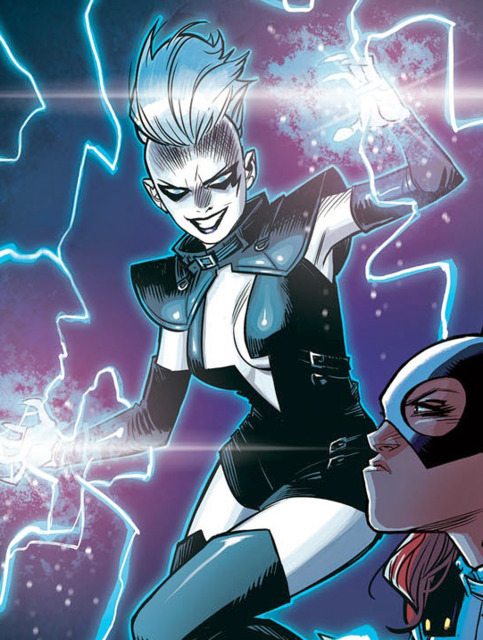
Livewire has always felt like she should be a bigger deal among the Superman villains, but at the same time I get to a certain extent why she hasn’t been. She’s got a great design, and Lori Petty’s voice did as much to define her as Arleen Sorkin did for Harley Quinn, but the more I think about her, the more she runs into problems. She’s not especially meant to be taken seriously - her ‘criticisms’ of Superman are deliberately framed as petty and shallow, to an extent that changing them would essentially rewrite her already pretty well-defined personality. So what you’ve got is a villain who won’t really hurt Superman (given one of his most iconic covers is taking a lightning bolt to the chest with a reply of “It tickles!”, electricity isn’t much of a plausible threat to him) who can still avoid him while causing a ruckus throughout Metropolis, mocking him all the while…and, well, that’s Mxyzptlk. Plus, while Mxy while might bring a vague air of sleaze with him in a way that can leave Superman a touch out of his depth, he’s still deliberately ridiculous, while Leslie Willis is typically much more straightforward and pointed in how she tries to take him down a peg or two in a way that can too easily slide into showing him as stodgy and boring by comparison.
The solution then I think is to bend her away from being a character who has direct confrontations with him all that often. One of her big shticks is that she can manipulate media broadcasts, usually just to make fun of Superman before they throw down. But what if that got pushed further? Make her instead a ghost in the machine riling up idiots on message boards who find the idea of tearing down Superman simply for the sake of it a riot; she could be a one-woman Anonymous, the Bad Media to the Daily Planet’s Good Media, drawing a line under how much of Metropolis hasn’t been hearing Superman’s message at all, needing both to be stopped, and to themselves be saved from far more than a meteor or robot (which would also do a lot to counter the image of Metropolis as a generically perfect city). Ironic, detached cynicism vs. unapologetic sincerity. In short, 4chan vs. Superman, winner take all.
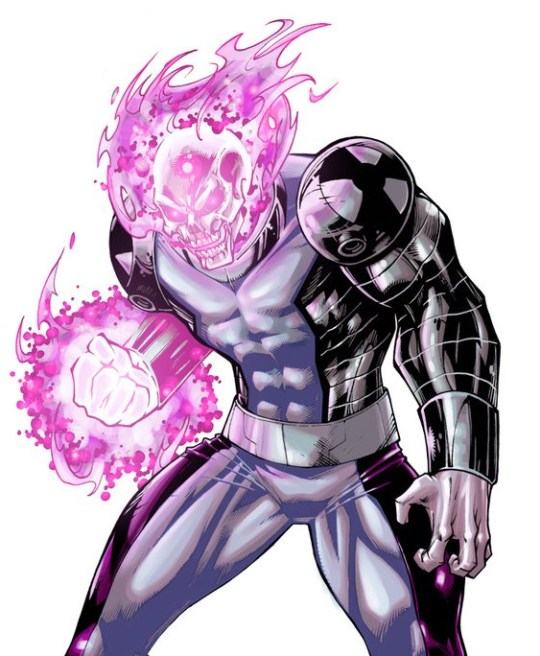
Atomic Skull is, what, an actor with amnesia who thinks he’s a movie villain or something? Meh. I guess there’s something to play with in the idea of his powers as inherently dangerous, evoking Superman’s own fears of losing control, but that seems kinda shallow. I know Superwoman has shown him as somewhat reforming, which seems like a good hook (some of his villains really should), but that’s a whole other angle that hasn’t really been developed yet. The one time I have really liked him was in a set of stories immediately after Electric Superman where each of the four Superman titles briefly told stories set in different eras, with a version of the Skull in the first Golden Age story. A movie star who parlayed his fame as an American Nazi propagandist, he tried to attach himself to Superman’s own increasing public recognition - given he too wore a caped uniform in the serial Curse of the Atomic Skull - claiming they were both examples of the emergence of ubermenschen to reclaim the world. Mesh that with his traditional powerset and contemporary context, and I have an idea of him as some kind of hyper-reactionary, ‘realpolitk’-espousing nihilistic superman of skinheads, alt-righters, and crazed survivalists, who see him as the firey atomic nu-human of an apocalyptic tomorrow. He could even hook up with the Supremacists from Greg Pak and Aaron Kuder’s time on Action Comics for some easy recruits and henchmen.
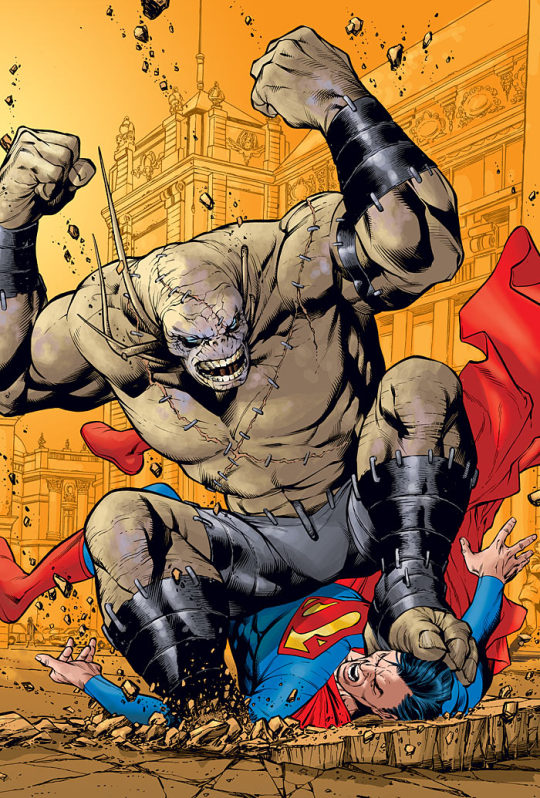
Subjekt-17; now here’s a guy who I wish had popped up again. Largely forgotten as a consequence of Kurt Busiek’s time on Superman being criminally overlooked, Subjekt-17 was a worst-case scenario: not able to pass for human in the same way as Kal-El, he was taken in by the Soviets as an infant and experimented on his entire life, only to be confronted by Superman when freed and trying to cut a swathe of blood through humanity as payment for his suffering. There was an interesting, painful dynamic in play there - he saw Superman as something like a brother, but in spite of his telepathy couldn’t understand why he would protect the humans who coldly tormented Subjekt his entire life, ultimately seeing Superman as so desperate to assimilate that he would fight an innocent to protect the guilty. I feel like there’s a lot more stories in him, and when it comes to the perennial question of “Are you sure you’re really doing the right thing, Superman?”, I feel like he as a victim of the establishment would have a much more consistent batting average for good stories than yet another edgy new antihero lecturing Superman about the Real Issues.
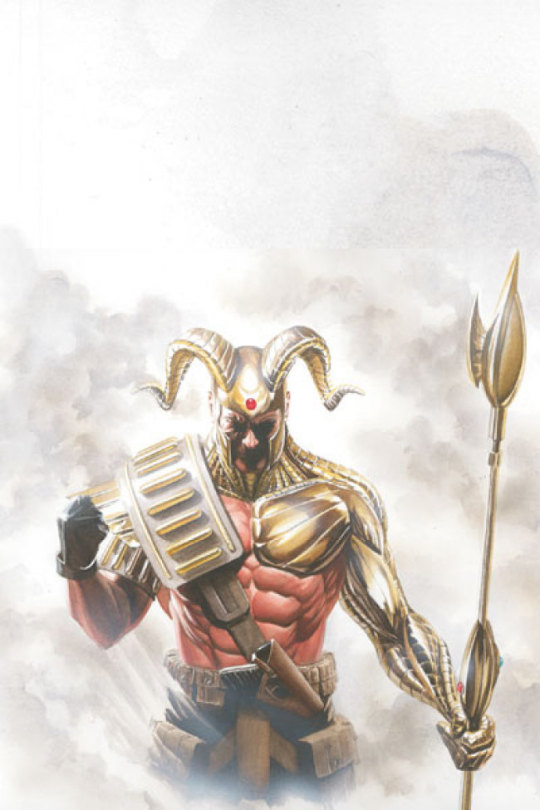
Magog doesn’t even feel like he should break C-list in the natural order of things, but he was in probably the most widely-read Superman-centric comic ever other than I suppose Death of Superman, so yeah, he counts as notable. The idea presented later on in The Kingdom with Gog as a worshiper of Superman whose shattered faith drove him to madness feels like it has almost a kernel of something interesting at the heart of it, but it feels much more so like a vehicle for semi-talented creators to write dumb comics with him that think of themselves as much more important than they are. A friend did have a decent take on what to do with him narratively though in a way that works with how he’s existed up until now: he’s not a threat himself, he’s not even a consistent or on his own necessarily important figure, but he’s a multiversal constant in that his arrival is always the prelude to a cosmic upheaval or an end of an age of heroes, and specifically catastrophe for Superman. His appearances even back it up: his time in Chuck Austen’s Action Comics was shortly before Infinite Crisis, he came on the scene in the New 52 shortly before Truth and the resulting death of that version of Superman, and now another seemingly new version of him is in Supergirl in the build-up to Doomsday Clock. There’s a lot you can play with there: he doesn’t even have to be the same character twice, but he always emerges to try and take Superman to task on some profound level as a harbinger to a greater doom for the DCU. Maybe over time he could have the same kind of narrative “him showing up means something” cache as Doomsday, but in the sense that seeing him means Superman’s going to have to ask some big questions about himself and what he does as preparation for a larger reckoning for him and his kind, rather than meaning Superman’s gonna have to punch a bone monster again.
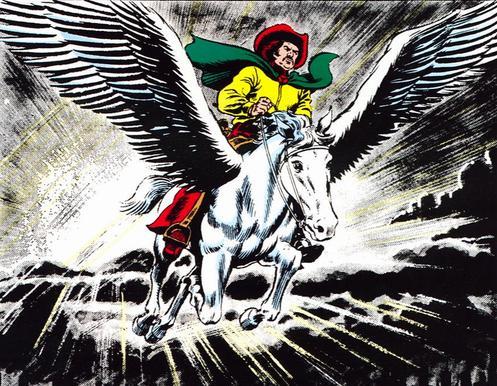
I wanna love Terra-Man. He’s a cowboy who was abducted by aliens and got a winged horse to fly around the universe, who calls himself Terra-Man because he a spaceman from Earth! That’s great! But I can’t say the execution has ever much interested me; he’s so over-the-top without ever especially being played as a gag that I just can’t get into it. Luckily though, the solution has already been reached with him: Tom Strong’s Coleman Grey, the Weird Rider, is straight-up Terra-Man, played with the melancholy, cold competency and swagger of a killer out of time, and some fantastic stone-cold badass moments that sell the hell out of him. Just apply that personality to this guy - fearsome but not unreasonable in the right circumstances, out of time but comfortable with his new life even if it means sometimes running up against the Man of Tomorrow - and we have an instant winner; maybe not one of the greats, but not every Superman opponent needs to bring major thematic concerns to the table so long as they can pull their weight in entertaining storytelling opportunities.
And now for a few rapid-fire takes:
Kryptonite Man was one of those characters who just had to exist sooner or later, but there’s really nothing about him that Metallo doesn’t make redundant.
To my knowledge Blackrock has never particularly worked, but I like the idea of him as a reality show hero who gets in Superman’s way sometimes. It doesn’t even need to be that specifically if those trappings are passe at this point; so long as he’s another vigilante opposed to Superman, you can probably pull something out of Blackrock.
Mindlessones convinced me that Nick O’Teen has a place in the background of Superman’s world.
Paragon is a comically awful human being with the powers to back up his inane egotism and cruelty in a way that actually quite worked for me under Kurt Busiek; I think he hits on the same “oh god dammit, this guy” response from Superman that Mxyzptlk elicits, but of a different enough flavor to make him worth keeping around as a separate figure.
And finally, while Tempus would probably lose a lot of his charm if up against a more straight-laced version of Superman, in the context of how silly Lois and Clark got he was my favorite part of that show, and I think he’d work fantastically in any other tongue-in-cheek Silver Age revival treatment of Superman’s world as a way to poke fun at the foundations, hilariously enough so it doesn’t grate but so over-the-top villainously we know we’re not supposed to agree with him.
#Superman#Livewire#Atomic Skull#Kingdom Come#Terra Man#Magog#Subjekt 17#Kryptonite Man#Blackrock#Nick O'Teen#Paragon#Tempus#Lois & Clark: The New Adventures of Superman#fanfic#Opinion
75 notes
·
View notes